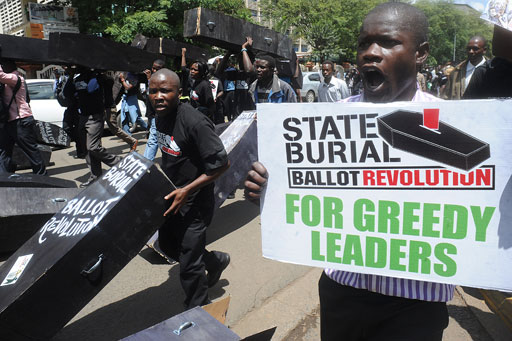Over the past ten years and specifically since President Kibaki’s administration kicked in I have watched the incredulity that has relegated Kenya’s civil society into irrelevance. When I was growing up I held individuals such as Timothy Njoya of the National Council of churches of Kenya (NCCK), Wangari Maathai of the Green belt Movement, Gibson Kamau Kuria of the Law Society of Kenya and other notable members in high esteem. I venerated these members of the the fourth estate and placed them on a pedestal, needless to say I did not place such a high premium on political leaders of the time. Political contextualization though is important before I elaborate how distinguished institutions have withered slowly but surely towards oblivion.
From the mid 1980s and perhaps after the aborted 1982 attempted coup de tat, the then president Daniel Moi engaged in a concerted drive to consolidate and coalesce; executive, legislative and judicial powers into the person and institution of the president. Back then imagining the death of the president was a treasonable offence that carried maximum capital punishment. Detentions without trial were the rule rather than the exception; political assassinations were rife and the dragon that was the ‘One party KANU regime’ extended its tentacles to all conceivable facets of Kenya’s social, economic and political life. Back then being expelled by the party: KANU meant losing once job in the civil service; party membership was mandatory since Kenya was a de jure one party state. Indeed it was the concerted efforts through the platforms of the different civil society groups that ultimately led to the repeal of: Section 2A of the Kenyan Constitution, hence ending the de jure one party rule in the country, some of these activists paid the ultimate price for their endeavor to liberate Kenyan society. The repeal of the Section 2A of the Kenyan constitution ultimately led to Kenya’s first multi-party elections in 1992.
Yet with all these apprehension, intrepid personalities like; Kamau Kuria, Wangari Maathai, Koigi Wamwere, and Timothy defied all odds and the status quo to offer the conceivable opposition to the Moi regime. Of course nobody can forget Timothy Njoya; a cleric being clobbered by Moi’s extremely brutal security machinery. No one can forget too, Wangari Maathai’s nude protest, with the mothers of detained civil activists at Uhuru-Park’s freedom corner and her concerted effort to prevent the government from building a 60-storey complex at Uhuru Park which is perhaps what catapulted her to the international limelight. Indeed it can be said that the myriads of civil liberties like right to; association, speech, liberty, and assembly that Kenyan’s take for granted today are the fruits of the efforts of these activists.
Fast forward and the Kibaki administration is installed in the year 2002. Kibaki for all the plaudits he has won is the one who started the destruction of civil society, brick by brick. His first administration included a quite a number of former civil activists as cabinet ministers. Kivutha Kibwana, Kiraitu Murungi, and Mirugi Kariuki are some of the few notable activists that were invited to have a piece of the pie by Kibaki. Needless to say that some of the former defenders of the people and avowed generals in the war against corruption did not waste time to disappoint Kenyans either by being blatantly corrupt or abetting corruption. Former Minister of Justice and Constitutional affairs was one of the former activists to be mentioned adversely in grand corruption in the Anglo-leasing saga. Though the 2002-2005 had its travails they are nothing compared to the travails of the grand coalition government installed by the national accord after the bloody 2007 general elections.
Civil society forums were used by both principles of the grand coalition government to dig at the roots of President Kibaki and Prime Minister Odinga. Civil society became the pied pipers of choice to bring down the two protagonists in the coalition government. For his part Raila used forums like FORA, Okiya Omtata a notable civil activists to fell Mr. Kibaki, whereas paid up civil society activists were paid up to protest at the premiers office to drop gunny bags of maize following the maize scandal saga.
It is indeed important to note that some of this civil activists turned up on ballot papers sponsored by their patron political parties which in essence gnaws at the intent of civil activism in the first place. Some civil activists like AfriCog (African Centre For Open Governance) and prominent civil activist bloggers like Dennis Itumbi and Moses Kuria have continued to be used as avenues to settle political scores and gain leverage as is the case where both AfriCog, Itumbi and co. have filed petitions in the Supreme with it being apparent that AfriCog is an ODM stooge (Odinga) and Itumbi plays to the tune of TNA (Kenyatta).
The institution of civil-political activism has been watered a great deal, it needs redemption in this country and this will only happen when a new generation-institution with virtue as its only tenet come to the fore in Kenya. Timothy Wafula a prominent governance scholar in Kenya contends that the norm in current generation civil-political activism is to ‘make a hella of a noise expecting to be paid to keep quiet.’ Needless to say that civil societies need to remain apolitical for them to be considered unabridged mouthpieces of the people’s opinion.
Alex Ndungu Njeru wrote in from Kenya


